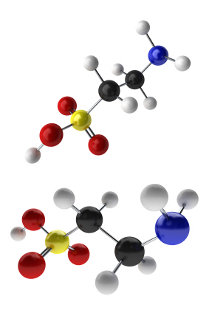Taurine
Taurine is a byproduct of the sulphurous amino acids cysteine and methionine. Contrary to common belief, Taurine is in itself not an amino acid in the scientific sense, as it does not contain a carboxy group. It is therefore in fact an amino sulphonic acid.
Taurine is important for the body because of its part in the maintenance of organ and cell function. Because of its capabilities, such as being able to stabilize the fluid balance in the cells, its antioxidant effects and its relatively high presence in the heart muscles, we have decided to include it here.
 Taurine is important for the heart
Taurine is important for the heart
The concentration of the amino sulphonic acid taurine in the heart muscle cells is significantly higher that of all of the other amino acids. At 50%, it is the highest percentage of the entire free amino acid pools in the heart. In this way, taurine has an anti-arrhythmic as well as a positive inotropic effect on the heart, meaning it increases the regularity and strength of the heart concentration. Besides the blood pressure regulating properties, supplementation with taurine can be useful to lower cholesterol levels, as taurine stimulates the gall bladder.1
Sources
1 Chapman, R.A., Suleinan, M.S. & Earm, Y.E. (1993) Taurine and the heart, Cardiovascular Research, Volume 27, issue 3, (pp. 358-363)